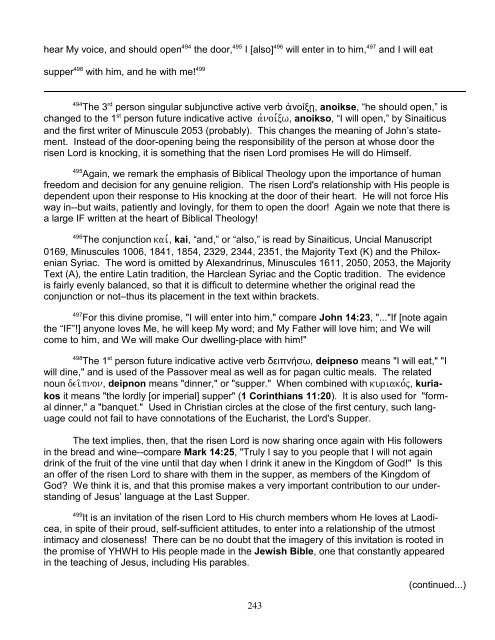Revelation 3:14-22 - Indepthbible.org
Revelation 3:14-22 - Indepthbible.org
Revelation 3:14-22 - Indepthbible.org
Create successful ePaper yourself
Turn your PDF publications into a flip-book with our unique Google optimized e-Paper software.
494 495 496 497<br />
hear My voice, and should open the door, I [also] will enter in to him, and I will eat<br />
498 499<br />
supper with him, and he with me!<br />
494 rd<br />
The 3 person singular subjunctive active verb íïßî, anoikse, “he should open,” is<br />
st<br />
changed to the 1 person future indicative active avnoi,xw, anoikso, “I will open,” by Sinaiticus<br />
and the first writer of Minuscule 2053 (probably). This changes the meaning of John’s statement.<br />
Instead of the door-opening being the responsibility of the person at whose door the<br />
risen Lord is knocking, it is something that the risen Lord promises He will do Himself.<br />
495<br />
Again, we remark the emphasis of Biblical Theology upon the importance of human<br />
freedom and decision for any genuine religion. The risen Lord's relationship with His people is<br />
dependent upon their response to His knocking at the door of their heart. He will not force His<br />
way in--but waits, patiently and lovingly, for them to open the door! Again we note that there is<br />
a large IF written at the heart of Biblical Theology!<br />
496<br />
The conjunction kai, kai, “and,” or “also,” is read by Sinaiticus, Uncial Manuscript<br />
0169, Minuscules 1006, 1841, 1854, 2329, 2344, 2351, the Majority Text (K) and the Philoxenian<br />
Syriac. The word is omitted by Alexandrinus, Minuscules 1611, 2050, 2053, the Majority<br />
Text (A), the entire Latin tradition, the Harclean Syriac and the Coptic tradition. The evidence<br />
is fairly evenly balanced, so that it is difficult to determine whether the original read the<br />
conjunction or not–thus its placement in the text within brackets.<br />
497<br />
For this divine promise, "I will enter into him," compare John <strong>14</strong>:23, "..."If [note again<br />
the “IF”!] anyone loves Me, he will keep My word; and My Father will love him; and We will<br />
come to him, and We will make Our dwelling-place with him!"<br />
498 st<br />
The 1 person future indicative active verb äåéðíÞóù, deipneso means "I will eat," "I<br />
will dine," and is used of the Passover meal as well as for pagan cultic meals. The related<br />
noun dei/pnon, deipnon means "dinner," or "supper." When combined with kuriako,j, kuriakos<br />
it means "the lordly [or imperial] supper" (1 Corinthians 11:20). It is also used for "formal<br />
dinner," a "banquet." Used in Christian circles at the close of the first century, such language<br />
could not fail to have connotations of the Eucharist, the Lord's Supper.<br />
The text implies, then, that the risen Lord is now sharing once again with His followers<br />
in the bread and wine--compare Mark <strong>14</strong>:25, "Truly I say to you people that I will not again<br />
drink of the fruit of the vine until that day when I drink it anew in the Kingdom of God!" Is this<br />
an offer of the risen Lord to share with them in the supper, as members of the Kingdom of<br />
God? We think it is, and that this promise makes a very important contribution to our understanding<br />
of Jesus’ language at the Last Supper.<br />
499<br />
It is an invitation of the risen Lord to His church members whom He loves at Laodicea,<br />
in spite of their proud, self-sufficient attitudes, to enter into a relationship of the utmost<br />
intimacy and closeness! There can be no doubt that the imagery of this invitation is rooted in<br />
the promise of YHWH to His people made in the Jewish Bible, one that constantly appeared<br />
in the teaching of Jesus, including His parables.<br />
243<br />
(continued...)

















